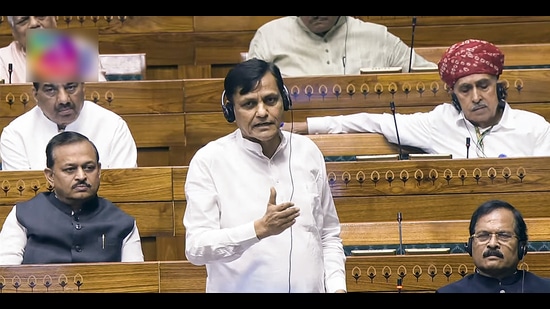
The Union government on Thursday introduced the Disaster Management (Amendment) Bill 2024 in the Lok Sabha, proposing key changes to the existing Disaster Management Act of 2005, including a new authority for cities.

The bill seeks to establish an Urban Disaster Management Authority for state capitals and cities with municipal corporations to address urban disasters, and proposes creating a “disaster database” at national and state levels.
Under the new legislation, the National Disaster Management Authority (NDMA) and State Disaster Management Authorities (SDMA) would be empowered to prepare disaster management plans, a task previously handled by executive committees at the national and state levels. The authorities would also be allowed to appoint experts and consultants.
The bill’s objectives cite the government’s efforts to mainstream disaster management in development plans, align with Finance Commission recommendations, and incorporate lessons from past disasters.
“The Disaster Management Act, 2005 has been reviewed in consultation with all stakeholders including state governments,” said the objective and reasons for bringing the bill that was introduced in the Lok Sabha by minister of state for home affairs Nityanand Rai.
Experts, who have seen the copy of the bill, said some of the amendments were long due and practical.
Its key provisions include creation of a comprehensive disaster database including assessment, fund allocation, expenditure, preparedness, and risk registers, the formation of an Urban Disaster Management Authorities chaired by municipal commissioners, with district collectors as vice-chairpersons, and empowering the NDMA to periodically assess disaster risks, including emerging threats, and issue updated mitigation guidance.
Disaster management professional, Col (Retd) Sanjay Srivastava, from Climate Resilient Observing Systems Promotion Council (CROSPC) and faculty at The Energy and Resources Institute School of Advanced Studies, said: “There are key changes. SDMAs and NDMAs will be able to prepare the plan, which is a good move. They know the terrain and geography of the state well. The plans, earlier prepared by National Executive Committee (NEC) and the State Executive Committee (SEC) are by bureaucrats using borrowed wisdom. In a state like West Bengal, the disaster management plan for a city like Kolkata or Burdman, will be different from a hill district like Darjeeling. The local administration knows the issue well and can make specific plans. They have been empowered to bring in experts who know the subject well.”
However, opposition leaders raised concerns.
Congress MP Manish Tewari sought clarification on the constitutionality of the Bill. Tewari said that the government needs to amend the Concurrent List to include a separate entry for Disaster Management. Tewari pointed out that given the increasing frequency of disasters and the fact that local authorities are usually the first responders, there is a need for a clear law with well-defined legislative powers. “The Bill suffers from the malady of excessive delegation.”
TMC MP Saugata Ray also opposed the Bill. He said, “Multiplicity of authorities leads to confusion. The Kerala Chief Minister is saying they did not receive warnings, while the Union Home Minister is saying warnings were given.” He criticized the Bill for creating additional authorities, arguing, “At the time of natural disasters, this will create bureaucratic hurdles.”
Rai responded to this. He said, “The first responsibility to respond to a disaster is of the state; we are not interfering through this Bill.”
Manu Gupta, co-founder of SEEDS (Sustainable Environment and Ecological Development Society), said: “This initiative marks a transformative step toward enhancing our nation’s capacity for disaster risk reduction and environmental sustainability. A comprehensive, centralised disaster database at both national and state levels will significantly improve our ability to prepare for, respond to, and recover from disasters. At SEEDS India, we have consistently emphasized the importance of data-driven strategies in building resilient communities. The creation of this disaster database will facilitate more efficient resource allocation, better coordination among stakeholders, and timely, informed decision-making during crises.”